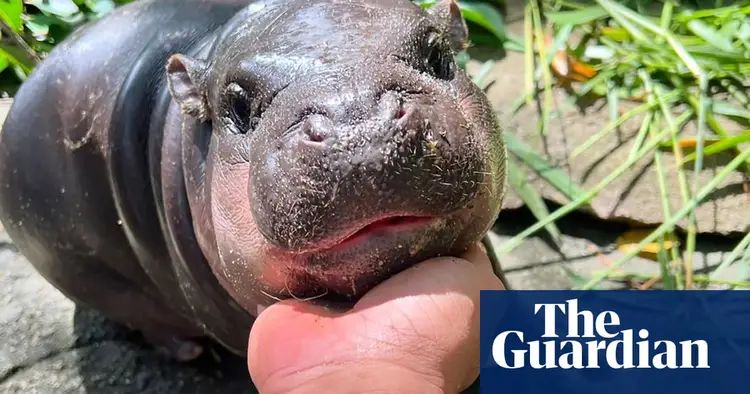‘I set a goal to make her famous’: the baby pygmy hippo who became a giant online

A two-month-old pygmy hippopotamus has captured the hearts of people in Thailand and around the world after videos of her playfully waddling in her habitat, gently nipping at her zookeeper, and enjoying a splash of water went viral online.
Moo-Deng has won over many fans throughout Asia. People have created cakes and artwork that feature her playful rosy cheeks and bright eyes. One beauty brand even embraced the trend, encouraging users on social media to "apply your blush like a baby hippo" while advertising their pink and peach cosmetic products. Highlighting her increasing influence worldwide, Time magazine referred to her as an “Icon” and “Legend”, declaring that “She Is the Moment.”
She gained her popularity through a TikTok account that boasts 2.5 million followers, showcasing the hippos and various other animals at Khao Kheow Open Zoo in Chonburi, Thailand. Additionally, hundreds of thousands of users keep up with their everyday activities on Facebook and Instagram.
Atthapon Nundee, 31, who works as a zookeeper at Khao Kheow Open Zoo, shared that he started uploading videos of animals to social media during the pandemic because he suddenly had more free time. The animal that has captured the most interest is Moo-Deng, which translates to “bouncy pork” and is also a name for a Thai dish.
"When I first laid eyes on Moo-Deng as she was born, I made it my mission to make her a celebrity. I never imagined that her fame would reach beyond our borders. I believed she would become well-known in Thailand, but I didn’t think it would expand to an international level," he shared.
Videos posted by travelers on social media have played a significant role in boosting her online popularity, but her personality has contributed as well, according to Atthapon. "People refer to her as 'bouncy,' and that fits her perfectly," he noted. Her siblings also have names inspired by pork dishes: her half-sister is named Moo Wan (which means Thai sweet pork), her other half-sister is named Pha Lor (pork belly stew), and her brother goes by Moo Tun (stewed pork).
Her growing fame has led to a significant increase in the number of visitors at the zoo, sparking worries about her well-being. Some tourists have been reported for tossing water and seashells at Moo Deng to rouse her, seemingly in an effort to get photographs.
Zoo officials have criticized individuals attempting to bother Moo-Deng. Atthapon mentioned that they have set up security cameras and assigned an officer to monitor her closely.
“She spends most of her time napping,” Atthapon remarked, noting that her actions resemble those of a human infant, characterized by moments of playfulness interspersed with ample sleep. “She only drinks her mother's milk and doesn’t consume anything else yet.” At just two months old, she already tips the scales at over 20 kg, and it’s likely she will start munching on grass next month.
Adult pygmy hippos tend to spend a lot of time sleeping throughout the day. According to Atthapon, “They mainly sleep and relax in the water since it can get really warm.”
Pygmy hippos are classified as endangered according to the IUCN Red List. A study from 1993 estimated that there are around 2,000 to 2,500 of these animals left in their natural habitat. They are found in West Africa, where they inhabit swamps and riverbanks. Unfortunately, their populations are at risk due to habitat destruction caused by human activities like logging, mining, and hunting.
Edwin Wiek, the person behind Wildlife Friends Foundation Thailand, raised concerns about the necessity of housing additional pygmy hippos in zoos, where breeding has already been successful. He believes the emphasis should instead be on preserving their natural habitats. "These animals are highly endangered, but with effective protection and a solid conservation strategy in the wild—if we just let them be—they can thrive," he stated.
Atthapon stated that the zoo strives to maintain Moo-Deng and the other animals in an environment that closely resembles their natural habitat. He also emphasized that zoos play an important role in conservation efforts.
“Atthapon expressed his hope that Moo-Deng's adorable nature will encourage people to come and discover more about this species.”









































